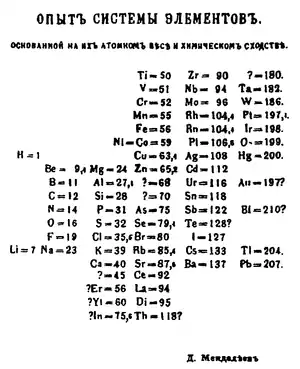1869 in science
The year 1869 in science and technology involved some significant events, listed below.
| |||
|---|---|---|---|
|
| 1869 in science |
|---|
| Fields |
| Technology |
| Social sciences |
|
| Paleontology |
| Extraterrestrial environment |
|
|
| Terrestrial environment |
|
|
| Other/related |
Events
- November 4 – The first issue of scientific journal Nature is published in London, edited by Norman Lockyer.
Chemistry

Mendeleev's 1869 periodic table
- March 6 – Dmitri Mendeleev makes a formal presentation of his periodic table to the Russian Chemical Society.
- June 15 – John Wesley Hyatt patents celluloid, in Albany, New York.
- July 15 – Hippolyte Mège-Mouriès files a patent for margarine (as oleomargarine) in France as a beef tallow and skimmed milk substitute for butter.
- German chemist Lothar Meyer makes a formal presentation of the revised and expanded version of his independently-created 1864 periodic table, „Die Natur der chemischen Elemente als Funktion ihrer Atomgewichte".
- Publication of Adolphe Wurtz's Dictionnaire de chimie pure et appliquée begins in Paris.
Life sciences
- April 6 – The American Museum of Natural History is founded in New York.
- June 24 – Sea Birds Preservation Act passed in the United Kingdom, preventing killing of designated species during the breeding season, the first Act to offer any protection to British wild birds.[1]
- Paul Langerhans discovers the pancreatic islets.
- Friedrich Miescher discovers deoxyribonucleic acid (DNA) in the pus of discarded surgical bandages. Found in the nuclei of cells, Miescher names it "nuclein".
- Neurasthenia is first published as a diagnosis in psychopathology by Michigan alienist E. H. Van Deusen of the Kalamazoo asylum[2] followed a few months later by New York neurologist George Miller Beard.[3]
- French missionary and naturalist Père Armand David receives the skin of a giant panda from a hunter, the first time this species has become known to a Westerner;[4] he also first describes a specimen of the "pocket handkerchief tree", which will be named in his honor as Davidia involucrata.
- Alfred Russel Wallace publishes The Malay Archipelago.
Mathematics
- W. Stanley Jevons publishes The Substitution of Similars and has a "Logic Piano" constructed to work out problems in symbolic logic.[5]
- Hermann Schwarz devises Schwarz–Christoffel mapping.
Technology
- Approximate date – Henry Christopher Mance develops a practical military heliograph in the British Raj.[6][7][8]
Awards
Births
- February 14 – C. T. R. Wilson (died 1959), Scottish winner of the Nobel Prize in Physics.
- February 27 – Alice Hamilton (died 1970), American physician.[10]
- April 8 – Harvey Cushing (died 1939), American neurosurgeon.
- April 17 – Robert Robertson (died 1949), Scottish-born chemist.
- June 19 – Christopher Addison (died 1951), English anatomist and politician.
- July 18 – Maria von Linden (died 1936), German bacteriologist and zoologist.
- August 23 – Robert Gunther (died 1940), English historian of science.
- October 3 – Robert W. Paul (died 1943), English pioneer of cinematography.
- December 16 – Bertha Lamme (died 1943), American electrical engineer.
- Helen Boyle (died 1957), British physician and psychologist.
Deaths
- July 22 – John A. Roebling (born 1806), German American bridge engineer.
- July 28 – Carl Gustav Carus (born 1789), German physiologist and landscape painter.
- September 11 – Thomas Graham (born 1805), Scottish chemist.
References
- Barclay-Smith, Phyllis (1959). "The British contribution to bird protection". Ibis. 101 (1): 115–122. doi:10.1111/j.1474-919X.1959.tb02363.x. Archived from the original on 2013-01-05. Retrieved 2021-02-16.
- Van Deusen, E. H. (April 1869). "Observations on a form of nervous prostration (neurasthenia) culminating in insanity". American Journal of Insanity. 25 (4): 445–461. doi:10.1176/ajp.25.4.445.
- Beard, George (1869). "Neurasthenia, or nervous exhaustion". The Boston Medical and Surgical Journal. 80 (13): 217–221. doi:10.1056/NEJM186904290801301.
- "Giant Panda". Encyclopædia Britannica Online. 2010. Retrieved 2010-08-09.
- Grattan-Guinness, Ivor (2000). The Search for Mathematical Roots, 1870–1940. Princeton University Press. ISBN 978-0-691-05857-3.
- Woods, Daniel (2008). "Heliograph and Mirrors". In Sterling, Christopher (ed.). Military Communications: From Ancient Times to the 21st Century. ABC-CLIO. p. 208. ISBN 978-1851097326.
- Mance, Henry (1872-02-10). "The Heliograph or Sun Telegraph". United Service Institution of India. 1 (5): 123–130. hdl:2027/mdp.39015035103855. Retrieved 2013-06-16.
- Goode, Samuel (1875-06-14). "Mance's Heliograph, or Sun-Telegraph". Journal of the Royal United Service Institution. XIX (LXXXIII): 534–548. doi:10.1080/03071847509415772. Retrieved 2011-06-21.
- "Copley Medal | British scientific award". Encyclopedia Britannica. Retrieved 23 July 2020.
- Sicherman, Barbara (1980). Notable American Women: The Modern Period: a Biographical Dictionary. Cambridge: Belknap Press. p. 303. ISBN 978-0-67462-733-8.
This article is issued from Wikipedia. The text is licensed under Creative Commons - Attribution - Sharealike. Additional terms may apply for the media files.